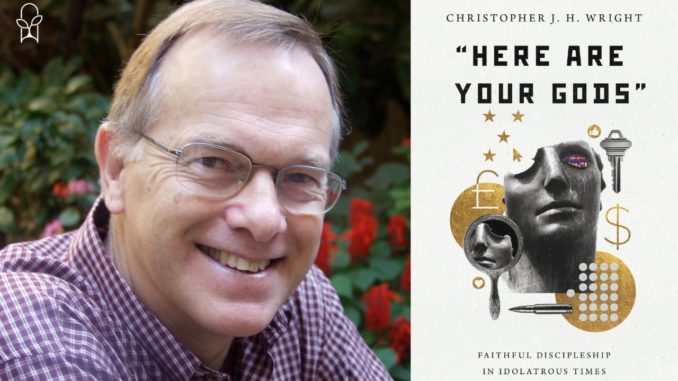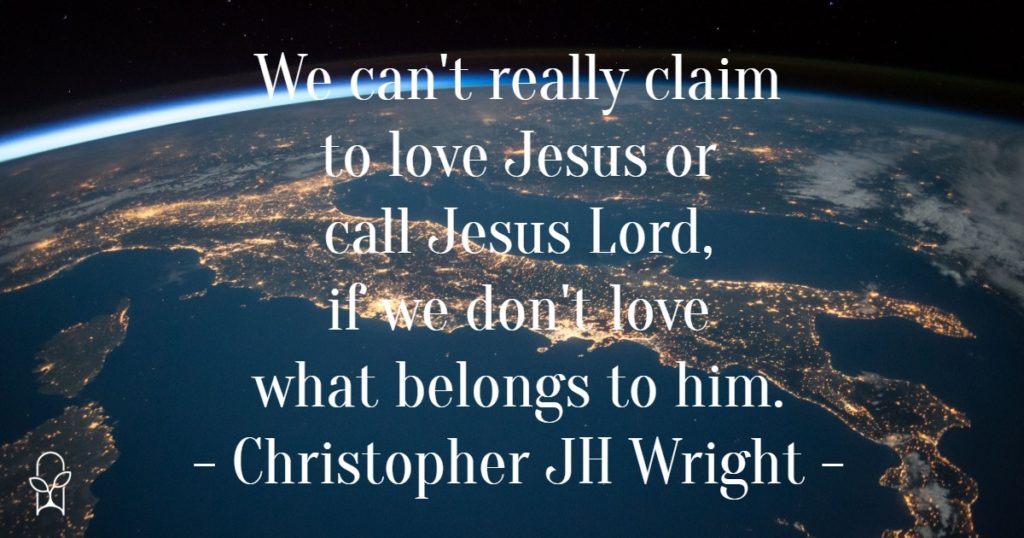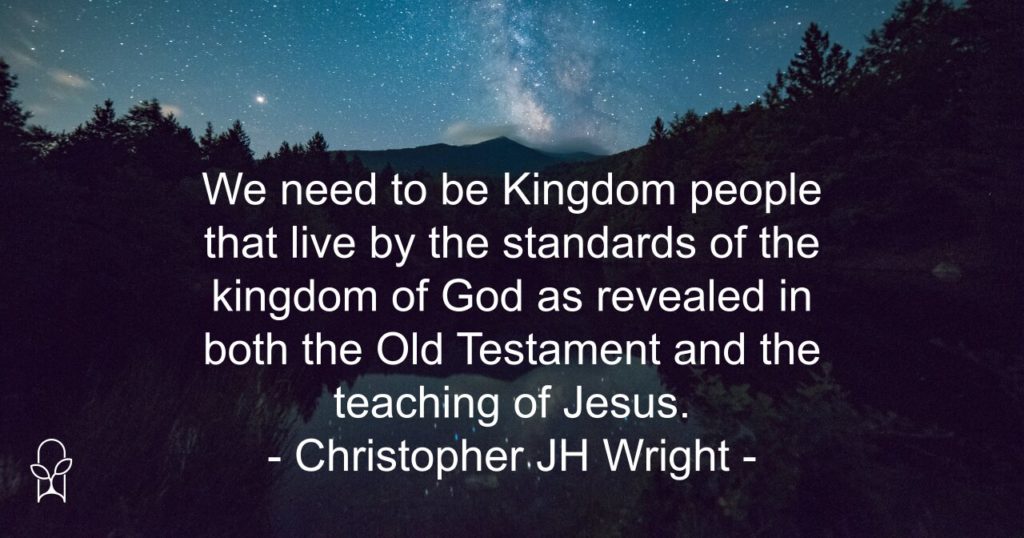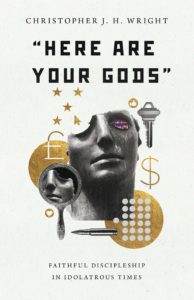
Podcast (beyond-the-page): Play in new window | Download
Subscribe: Apple Podcasts | RSS
Christopher J.H. Wright completely revolutionized the way I looked at the Old Testament with his seminal Old Testament Ethics for the People of God. It directly led to a closer study of the Law, which indirectly led to a closer study of the Prophets, which led to a year-long immersion into the book of Amos that profoundly affected my public-facing ministry and my views on political and social justice reform. When I learned of Here Are Your Gods, a critique showing how our modern-day idols in politics and culture are no different than the idols of old, I knew I had to have him on the podcast program to talk more about it. I absolutely loved this conversation and hope you will too.
The Conversation | Christopher JH Wright
This excerpt has been lightly edited for brevity and clarity. You can listen to the full interview by clicking the play button above or subscribing at Apple Podcasts, Stitcher, Spotify, or wherever you listen to podcasts.
Josh Olds: Now just to start, can you give the listeners a sort of summary of what this book is about?
Christopher JH Wright: Well, it’s basically a book about trying to identify—first of all—what the Bible has to say about idolatry and gods because many people aren’t aware of how much is there and why it matters. And secondly, it’s about how we can discern and identify the fact that we still live with false gods and idols all around us, not just in, as it were, people of other faiths in other parts of the world, but very much even within Western culture, and indeed, within Western Christianity. So it’s an attempt to bring together biblical teaching about what idols are and how that relates to the only true living God and how idols impact and affect our culture.
Josh Olds: When we look at the Hebrew Scriptures, it records, Yahweh as saying, you know, “You shall have no other gods before me.” And the skeptic looks at that and says, “Aha, so there’s an admission here that there are other gods.” How did the ancient Hebrew view Yahweh?

Christopher JH Wright: Well, I think it depends a little bit whether you ask the average Israelite at any particular time in Israel’s story, as the Old Testament shows us, or whether we’re talking about the canonical faith of Israel, as revealed by God and then embodied within the scriptures. I mean, the Old Testament doesn’t hold back at all in saying that the average Israelite, for many centuries, continued to mix the worship of Yahweh, the God of Israel, with going after other gods, the gods of the people around them, particularly the gods of Canaan.
But when, in my view, when we look at the very earliest documents within the Old Testament, we can see that what God was seeking to teach them was that there really is only one true God, and that is Yahweh. It’s not just that there’s only one God as if it was a kind of philosophical axiom, but rather, that “Yahweh alone is God in heaven above the earth” beneath quoting directly from Deuteronomy [4.29], “And there is no other.”
The point that some of those old testament scholars want to make, and I think, in some ways, they are not only mistaken, but somewhat patronizing, is that even to talk about other gods—as in the verse you quoted, you know, “you should have no other gods” or even referring to other gods assumes that they exist in the same way that Yahweh exists. But of course, even in our modern way of speaking, that would be nonsense. It would mean that, for example, I would not be able to even talk about the gods that are worshipped in India, and discuss or talk about the gods of Hinduism, without somebody telling you “Oh, you’re talking about those gods or even giving them names, you know, Rama and Krishna and Ganesh and so on, you must believe that they exist.”
Well, no, I’m talking about the phenomenon—the empirical fact that people do claim to worship these gods. That doesn’t mean that I believe that they are realities or anything like that. We speak about the living God as reality. So even the Apostle Paul was able to make that distinction in First Corinthians 8, when he says that there are many so called gods and lords, he could see them all around in the city of Corinth or temples with statues in them. So yes, there are many so called gods and lords, but we know he says that there is only one God the Father and one Lord Jesus Christ. So it’s an important distinction I think that the Bible makes.

Josh Olds: How do we do faith differently—if that can be a correct term—really begin to live on mission?
Christopher JH Wright: We need to be Bible people. That is, we need to see the whole Bible story and live it out and be in it and take our Bible seriously. We also need to be Kingdom people that live by the standards of the kingdom of God as revealed in both the Old Testament and the teaching of Jesus. We need to be people of prayer, seriously praying the Lord’s Prayer. We should be praying for God’s will to be done on earth as it is in heaven. I mean, that’s a massively political prayer, as are so many of the Psalms. Our prayers need to be a bit less anodyne and “God bless everybody” and actually praying to God to do something about the evil and injustice in the world and praying against those that perpetrate them, praying against those who are telling lies and doing injustice.
But in relation to being people of mission: they are evangelism, we have to have the centrality of the gospel, but also teaching and nurturing disciples. So there’s a work of pastoring and theological education. And then there are works of compassion, simply showing the love of Jesus. Going out into the world and just doing what Jesus did. Be doing good stuff. And I’m amazed, by the way, about the response to the COVID pandemic, and some of the poorest parts of the world and response to the refugee crisis. For example, in a country like Lebanon, which is a devastated and poor country with huge problems, and yet the Christian church there have reached out sacrificially and incredibly generously to Syrian Muslim refugees who were their enemies years ago, and are seeing remarkable fruits in terms of not only people being loved and cared for, but many, many of them come into faith in Jesus simply because Christians have loved them.
So there’s works of love and compassion, then, of course, seeking justice. And we’ve talked about that. And I think the Bible is very clear that it is a mandate that we are to seek justice. And fifthly, being the responsible use of and care for creation itself, which is called the first great commission that God gave to the human race—that we were to exercise dominion over the earth by caring for it and keeping it in balance. As he said, in the Great Commission, “all authority in heaven and earth,” that means in the whole creation is given to him. So we can’t really claim to love Jesus or call Jesus Lord, if we don’t love what belongs to him. And the Bible is very clear that the earth is belongs to God; it’s his property. And also, he’s redeemed it by the blood of his cross, as Paul says in Colossians.
So to somehow want to say you love Jesus, and you’re a Christian, and yet deny the importance of ecological and environmental issues that have to do with God’s creation seems to be a very strange position to be in. It’s like saying that you love your girlfriend, but you take her precious guitar and chuck it out the window and stamp on it. You trash her property, and yet you still say you love her? Well, that just don’t make sense, does it? And yet, there’s a lot of Christians who seem quite happy to say they love Jesus, and yet are content to trash his property.
The Book | Here Are Your Gods
 When the Israelites exclaimed, “Here are your gods!” at the sight of the golden calf, they were attempting to hold on to the God of their history while fashioning idols for their own purposes. In today’s Western world, plenty of shiny false gods still hold power―idols of prosperity, nationalism, and self-interest. Christians desperately need to name and expose these idols. We must retrieve the biblical emphasis on idolatry and apply it anew in our journey of following Jesus. In “Here Are Your Gods,” Old Testament scholar Christopher J. H. Wright combines a biblical study of idolatry with practical discipleship. He calls readers to consider connections between Old Testament patterns and today’s culture, especially recurring temptations to trust in political power. Now as much as ever, we need a biblically informed understanding of the many ways humans make gods for themselves, the danger of idols, and how God calls us to join him in the battle against idolatry as part of his ongoing mission to be known and worshiped by all peoples.
When the Israelites exclaimed, “Here are your gods!” at the sight of the golden calf, they were attempting to hold on to the God of their history while fashioning idols for their own purposes. In today’s Western world, plenty of shiny false gods still hold power―idols of prosperity, nationalism, and self-interest. Christians desperately need to name and expose these idols. We must retrieve the biblical emphasis on idolatry and apply it anew in our journey of following Jesus. In “Here Are Your Gods,” Old Testament scholar Christopher J. H. Wright combines a biblical study of idolatry with practical discipleship. He calls readers to consider connections between Old Testament patterns and today’s culture, especially recurring temptations to trust in political power. Now as much as ever, we need a biblically informed understanding of the many ways humans make gods for themselves, the danger of idols, and how God calls us to join him in the battle against idolatry as part of his ongoing mission to be known and worshiped by all peoples.
The Author | Christopher JH Wright
 Chris Wright was born in Belfast, Northern Ireland in 1947, the son of missionary parents, and nurtured as an Irish Presbyterian. After university in Cambridge, he started his career as a schoolteacher in Grosvenor High School, Belfast. Then, after completing a doctorate in Old Testament economic ethics in Cambridge, he was ordained in the Church of England in 1977 and served as a curate in the Parish Church of St. Peter & St. Paul, Tonbridge, Kent.
Chris Wright was born in Belfast, Northern Ireland in 1947, the son of missionary parents, and nurtured as an Irish Presbyterian. After university in Cambridge, he started his career as a schoolteacher in Grosvenor High School, Belfast. Then, after completing a doctorate in Old Testament economic ethics in Cambridge, he was ordained in the Church of England in 1977 and served as a curate in the Parish Church of St. Peter & St. Paul, Tonbridge, Kent.
In 1983 he took his family to India and taught at the Union Biblical Seminary (UBS), Pune for five years as a mission partner with Crosslinks (formerly BCMS). While at UBS he taught a variety of Old Testament courses at BD and MTh levels. In 1988 he returned to the UK as Academic Dean at All Nations Christian College (an international training centre for cross-cultural mission). Then he was appointed Principal there in September 1993.
In September 2001 he was appointed International Ministries Director of the Langham Partnership. This is a group of ministries originally founded by John Stott, committed to strengthening the church in the Majority World through providing resources for training evangelical theological educators to doctoral level, providing and helping to create evangelical Christian literature, and training pastors and lay leaders in biblical preaching.
Chris was the Chair of the Lausanne Theology Working Group from 2005 – 2011, and was the chief architect of The Cape Town Commitment – the Statement of the Third Lausanne Congress in October 2010.
Chris and his wife Liz, who have four adult children and eleven grandchildren, belong to All Souls Church, Langham Place, London, where Chris enjoys preaching from time to time as a member of the Staff team. Chris, who enjoys running, birding, and watching rugby, has a passion to bring to life the relevance of the Old Testament for Christian mission and ethics, and loves preaching and teaching the Bible.
